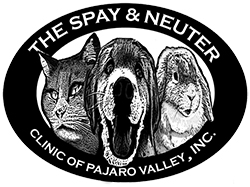
CLINIC LOCATION: 150 A Pennsylvania Dr.
Watsonville, CA 95076
MAIL TO: P.O. Box 2224
Aptos, CA 95001
(831)818-5007
thespayandneuterclinicofpv.com
thespayandneuterclinicofpv@gmail.com
Post-operative care instructions:
- Keep your pet quiet and indoors. Do not allow your pet to run, jump, play, swim, or do any other strenuous activity for 5-7 days. Do not bathe your pet during the recovery period. When dogs need to go outside, walk them on a leash. Dogs can go for short leash walks around the block at the most.
- Check the incision once to twice a day. Redness and swelling should be minimal and there should not be any drainage on males. If your female was in heat during surgery, there may be a small amount of vaginal discharge. Do not allow your pet to lick or chew at the incision.
- You may want to purchase an E-collar from your local pet store if your pet will be left alone for any period of time. The edge of the collar needs to be long enough to go past the tip of your pet’s nose.
- There are no sutures to be removed, unless otherwise specified by a clinic respresentative.
- Give your pet food and water when you get home. Your pet may not have his/her normal appetite back right after surgery.
- Do not change your pet’s diet at this time and do not give junk food, table scraps, milk or any other people food during the recovery period.
- Lethargy lasting for more than 24 hours, diarrhea, and/or vomiting is not normal. If any of these occur, your pet needs to be seen by a veterinarian.
Please note:
- Your pet received a green tattoo near his/her incision. This is to show that s/he has been surgically sterilized and it prevents your pet from undergoing an unnecessary sterilization surgery in the future.
- Do not be alarmed if your pet’s eyes look “weepy”. Eye lubricant was applied to your pet’s eyes prior to surgery to prevent the drying of his/her eyes.
- Animals could have a mild cough after surgery due to the breathing tube placed during surgery.
- If the cough is persistent or if nasal discharge is present, your pet may have an upper respiratory infection and you would need to follow up with your regular veterinarian.
- Your pet received pain medication(s) to help with pain control during the first 24 hours after surgery. If you think your pet needs additional medication, you are welcome to take them home today (with an additional charge) or contact your regular veterinarian.
- Do NOT give Tylenol, aspirin, or other pain relievers to your pet as these can be deadly to them.
- Anesthesia may wear off slowly, so your pet may appear drowsy this evening, but s/he will become progressively more active and alert with time. Cats may hallucinate as anesthesia wears off. Sounds, light, and touching may frighten them. Please separate your pet from other animals and young children tonight.